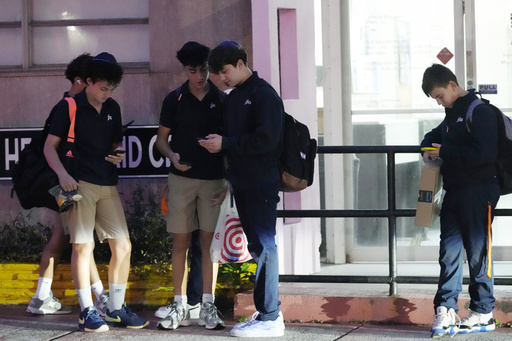
TALLAHASSEE, Fla. — Students are expressing their discontent over cell phone restrictions in classrooms, but they aren’t the only ones voicing concerns. In Broward County, Florida, where the public school system is the sixth largest in the nation, parents are also pushing back against a policy that prohibits cell phone usage during school hours, including lunch and breaks, without special permission.
This ban, which started at the beginning of the 2024 academic year in August, is among many measures schools across the country are taking to limit screen time. According to experts, excessive social media usage has become virtually universal among young people and is linked to increased rates of anxiety and depression in this demographic.
A recent survey conducted by the Broward County school district revealed that nearly 20% of over 70,000 respondents—comprising students, parents, and teachers—believe that the cell phone ban negatively impacts student well-being. A significant worry among parents and students is the lack of communication with family, particularly in emergency situations. This concern is particularly poignant in the Broward district, known for the tragic 2018 shooting at Marjory Stoneman Douglas High School that claimed 17 lives.
District officials have reassured the community that students are permitted to use their phones during emergencies and that teachers have the discretion to allow phone access for other necessary reasons. Erin Gohl, a parent and advocate within Broward, remarked that while there is a general agreement that students should not be on their phones during class, it is also essential to provide them with the tools they need, especially those that support their mental health.
The implementation of this policy has faced criticism for being inconsistent. Many teachers are struggling to monitor students’ phone usage, and in some instances, phones serve as necessary tools for accessing online lessons and submitting assignments, particularly for those lacking a school-issued laptop. Parents argue that having their phones can actually help students coordinate end-of-day pickups and communicate with them about issues such as bullying.
Broward Schools Superintendent Howard Hepburn acknowledged that it is unrealistic to expect a straightforward solution for this complex issue. He emphasized that the transition away from cell phone use will take time as both students and parents adapt.
Furthermore, Landyn Spellberg, a student advisor to the Broward school board, advocated for the benefits of having phones, stressing that the blanket ban is not equipping students with the skills to use technology responsibly. He noted that schools should focus on educating students about the potential downsides of technology instead of implementing broad prohibitions.
